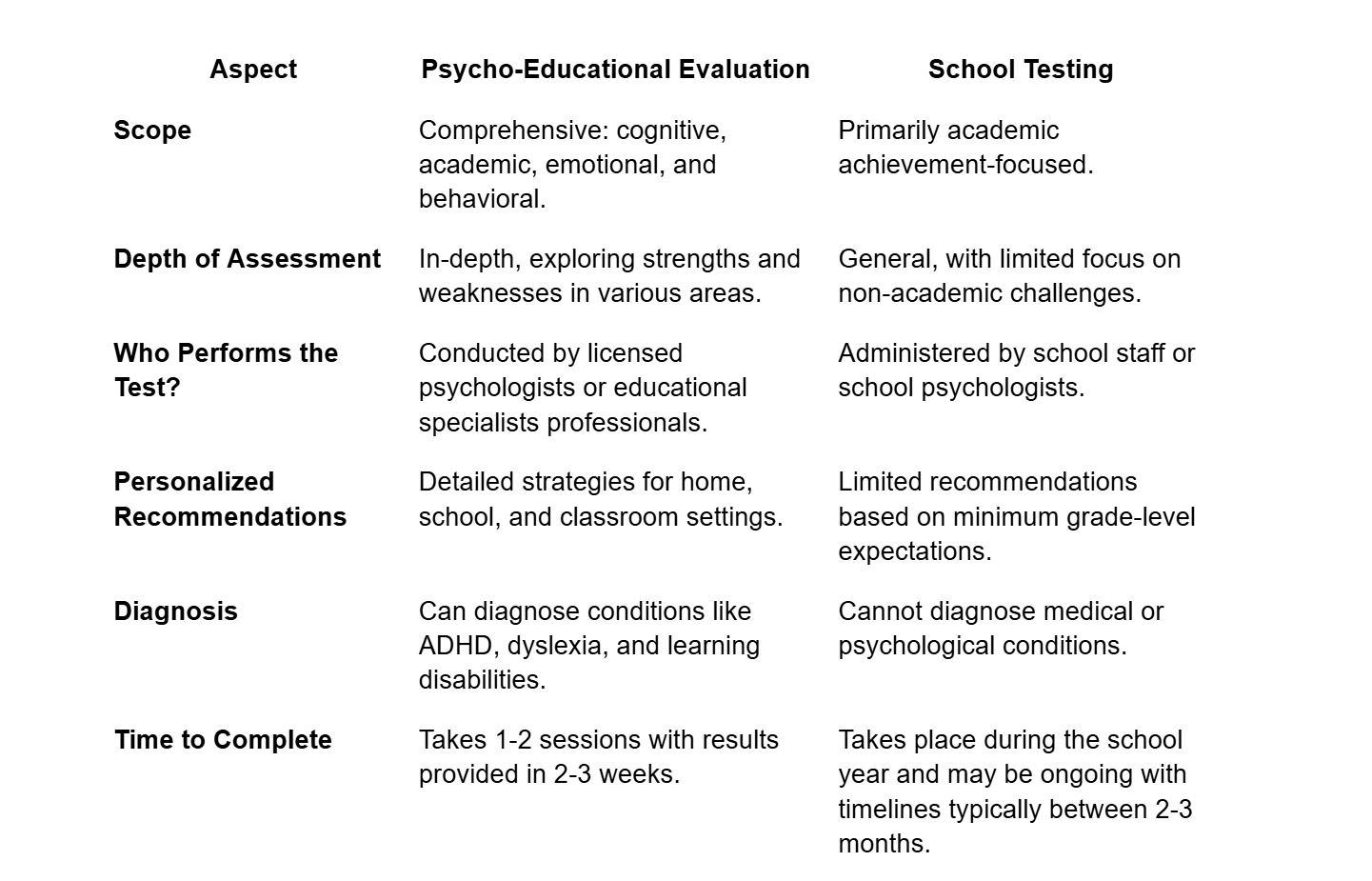Psycho-Educational Evaluation in Private Practice vs. School Testing: What’s the Difference and Which One Does Your Child Need?
As if you’re a parent, it’s natural to be concerned about your child’s academic progress or behavior. You you might have considered testing options to get a clearer picture of their needs. While school-based testing can be a starting point, many parents wonder whether they should pursue a psycho-educational evaluation with a private practice. In this blog, we’ll break down the key differences between psycho-educational evaluations and school testing, helping you decide understand which one is best suited right for your child.
WHAT IS A PSYCHO-EDUCATIONAL EVALUATION?
A psycho-educational evaluation is a thorough and comprehensive assessment that measures your a child’s cognitive abilities, academic skills, and emotional functioning. The goal is to identify any learning disabilities, giftedness, ADHD, and other academic or emotional challenges that might be affecting your child’s performance at school or in life. This type of evaluation provides valuable insights into how your child’s learning style learns and identifies what specific accommodations or interventions they may need to thrive.
Key Components of a Psycho-Educational Evaluation:
Cognitive Testing (IQ) – Measures your child’s intellectual abilities, such as reasoning, problem-solving, and memory.
Academic Achievement Testing – Assesses performance in subjects like reading, writing, and math to identify pinpoint areas of difficulty or struggle.
Behavioral and Emotional Assessments – Explores areas aspects as attention, executive functioning, social-emotional skills, and behavior.
Executive Functioning – Examines skills like time management, organization, and impulse control.
Recommendations for Interventions – Offers specific strategies and accommodations to help your child succeed at school and home.
WHAT IS SCHOOL TESTING?
School testing generally refers to the assessments and evaluations that are done within the school system, often aimed at evaluating and identifying academic progress or determining whether a child needs special education services. These tests are usually conducted by school psychologists or special education staff and focus on the child’s academic performance relative in relation to grade-level expectations.
While school tests can help determine if identify whether your child is meeting grade-level standards, they are often limited in their scope and don’t diagnose conditions like ADHD, dyslexia, or giftedness. Additionally, school testing may also be influenced by time constraints or the availability of resources, leading to more generalized results.
Key Components of SCHOOL TESTING:
Standardized Assessments – Evaluate whether a child’s academic skills meet the minimum requirements for their grade.
Classroom Observations – Assesses your child’s behavior in the school environment, but may not consider outside factors or emotional struggles.
Teacher Reports – Offers insights based on classroom performance and behavior, but may lack a deep dive into specific learning difficulties.
Limited Scope – School testing generally does not doesn’t explore social, emotional, or behavioral issues in detail, such as ADHD or anxiety.
KEY DIFFERENCES BETWEEN PSYCHO-EDUCATIONAL EVALUATION AND SCHOOL TESTING
WHY CHOOSE A PSYCHO-EDUCATIONAL EVALUATION OVER SCHOOL TESTING?
You might be wondering why you should choose a private psycho-educational evaluation over school testing. While school assessments are a great starting point, they have several limitations when it comes to fully understanding the whole picture of your child’s learning and emotional needs.
Here’s why a psycho-educational evaluation might be the better choice:
1. More Comprehensive Data
Psycho-educational evaluations provide a fuller picture of your child’s abilities. It not only identifies academic challenges but also evaluates emotional well-being, attention, executive functioning, and behavioral issues. —giving This comprehensive view gives you a roadmap for addressing any obstacles your child might face, by identifying the root causes of academic or behavioral difficulties.
2. Tailored Assessments
Psycho-educational assessments are highly individualized. They provide detailed, personalized findings based on assessments uniquely selected to identify the areas where your child needs support.
3. Personalized Insights and Recommendations
Unlike school testing, which can sometimes provide limited, one-size-fits-all suggestions, a psycho-educational evaluation gives you personalized recommendations for helping how to help your child succeed in both academic and social settings, at offers suggestions that can be implemented both in school and at home.
4. Early Diagnosis and Intervention
When a child has conditions like ADHD, dyslexia, or anxiety, early diagnosis is crucial. A psycho-educational evaluation can help identify these issues early on, allowing you to implement the right interventions and accommodations tailored to your child’s specific needs. Additionally, early intervention can prevent future academic struggles and improve your child’s overall well-being.
5. More Flexibility and Time-Sensitivity
Unlike school testing, which may be limited by time and resources, a psycho-educational evaluation offers more extensive assessments administered in a relaxed one-on-one setting, which can help uncover subtle concerns that school testing might miss. It is also done in a more time-sensitive manner and has a much quicker turnaround compared to school-based testing.
6. Objective and Unbiased Perspective
Psycho-educational evaluations are independent of the school system, which means that they are less likely to be influenced by school policies or pressures. This neutrality can provide an objective view that may be beneficial when advocating for additional support services such as an IEP or a 504 plan.
7. Advocacy for Special Services
Lastly, if your child needs an IEP or a 504 plan for academic support, a psycho-educational evaluation can provide the documentation needed to ensure they get the services they deserve, which something school testing alone might not always achieve.
WHICH ONE DOES YOUR CHILD NEED?
At this point, you are likely trying to decide if you’re wondering whether a psycho-educational evaluation or school testing is the best choice. Consider these key points:
If your child is struggling academically and you need a clear understanding of their learning style, strengths, and challenges, a psycho-educational evaluation is a great option.
If your child exhibits specific behaviors or symptoms like impulsivity, inattention, or learning difficulties, and you need a formal diagnosis or personalized interventions, a psycho-educational evaluation will provide the depth of information you need.
If your child is already receiving school accommodations but you want to dig deeper into their emotional or cognitive challenges, a psycho-educational evaluation is the best way to go.
If you’re unsure and need clarity on the next steps, our team at The Mind Center LLC offers free consultations to help you decide the best path forward.
Don’t leave your child’s future to chance. At The Mind Center LLC, we specialize in psychoeducational evaluations that help children thrive both academically and emotionally. If you’re ready to take the next step in understanding your child’s needs, book a free 15-minute consultation with us today.
Visit https://themindcenterforkids.com/workshop to get started.
The Mind Center, LLC is a thought leadership mental health brand dedicated to helping parents, their kids, and the schools they attend. At The Mind Center LLC, we specialize in psycho-educational evaluations and offer a range of services to support children. Contact us today.




